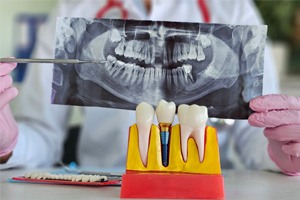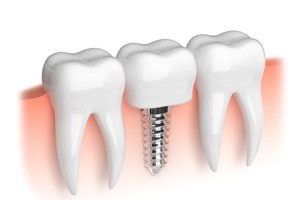
Dental Implants - East Hartford, CT
The Gold Standard in Tooth Replacement

We offer a number of treatments that can replace missing teeth. However, we always recommend that our patients opt for dental implants if possible. Dental implants rebuild teeth from the roots up and thus provide the most natural-feeling and natural-looking way to restore full dental function. At Comprehensive Dental Associates of Central Connecticut, we are proud to be able to provide complete dental implant services. Contact us today to learn how dental implants in our East Hartford, CT dental office may be able to benefit you.
Why Choose Comprehensive Dental Associates of Central Connecticut for Dental Implants?
- Start to finish convenience
- Advanced technology aids in placement and restoration
- Highly trained and experienced team
What Is a Dental Implant?

A dental implant is a small cylinder (sometimes called a post) that acts as a substitute tooth root. After it gets placed in the jawbone, it fuses with the tissue around it via a process called osseointegration. It thus becomes a sturdy base for the crown, bridge, or denture that will replace the visible portion of the lost dentition. Dental implants are usually made out of a titanium alloy, which is extremely durable and biocompatible.
Benefits of Dental Implants

Dentists throughout the U.S. place countless implants in patients each year. What accounts for the astounding popularity of this treatment? Simply put, no other form of tooth replacement can measure up to the many benefits that dental implants provide. What are some specific advantages that you can expect with this treatment? Here are just a few of the reasons why dental implants are the best tooth replacement solution that modern dentistry has to offer:
Day-to-Day Benefits

Dental implants may improve your daily quality of life in several ways:
- Natural function. Dental implants actually fuse with the bone around them. They thus become substitute tooth roots and are able to provide you with an incredibly strong bite force. That means you can eat virtually any food with confidence!
- Easy maintenance. You can care for dental implants in much the same way as you would care for natural teeth. Thorough oral hygiene and regular dental visits are both important.
- Aesthetics. Dental implant restorations bear such a strong resemblance to natural teeth that no one will find it easy to tell that you have had some dental work done. You can expect to be able to smile with confidence in virtually any situation.
- Clearer speech. Speech depends on interactions between multiple structures, including the teeth. Dental implants can allow you to enunciate words with clarity and crispness.
Health Benefits

Dental implants may benefit your oral and overall health in numerous ways:
- High success rate. The dental implant procedure is successful in over 95 percent of cases, so there is no need to be overly concerned about serious post-treatment complications.
- Jawbone preservation. Because dental implants fuse with the jawbone, they stimulate it and help it to remain whole. In contrast, traditional dentures can actually accelerate bone loss in the jaw.
- Better digestion and nutrition. Dental implants can allow you to chew food thoroughly, which can be crucial for easy digestion. Plus, they can help you eat a variety of nutrient-dense foods that support oral and overall health.
- Benefits for natural teeth. Dental implants can serve as placeholders that prevent your remaining natural teeth from drifting out of shape. Plus, unlike traditional bridges, dental implants do not usually require any modifications to nearby teeth.
Long-Term Benefits

Dental implants can start delivering benefits shortly after you receive them, and some of those benefits can stretch far into the future.
- Longevity. Dental implants have the potential to last for decades — perhaps even for an entire lifetime. The restorations on top of the implants can also stand the test of time.
- Save money. Although dental implants have a higher upfront cost than other forms of tooth replacement, their outstanding longevity can make them a better long-term value. In fact, if you calculate their cost per day over a few days, they become surprisingly affordable!
- Higher quality of life in your senior years. The health benefits of dental implants may contribute to a high quality of life as you enter your senior years. Plus, since tooth loss is associated with a decreased life expectancy, there is a chance that dental implants could help you live longer!
The 4-Step Dental Implant Process

Would you like to learn more details about how dental implants work?? Continue reading below.
Initial Dental Implant Consultation

Your initial consultation serves as the launching point for the rest of your tooth replacement journey. During this important appointment, we will:
- Perform a visual examination of your mouth.
- Use advanced imaging equipment to take a look at your jawbone.
- Ask about your medical history.
- Answer your questions.
- Start to plan the details of your treatment.
If we determine that you are not immediately a candidate for dental implants, we may recommend that you undergo certain preparatory procedures, such as a bone graft or gum disease therapy, before you move forward with tooth replacement.
Dental Implant Surgery

As a skilled implant dentist in East Hartford, our team is able to perform dental implant surgery right here in our office. There is no need for you to go through the hassle of visiting an outside specialist, and you can still rightly expect to receive excellent care.
The surgery itself is fairly straightforward. First, we will use local anesthesia (and possibly sedation) to make you comfortable. Next, we create incisions in the gums and carefully place the implants at their pre-planned positions. Once the incisions are closed, you can go home to start recovering. Most patients are able to return to work within a day or two of their procedure.
Dental Implant Osseointegration & Abutment Placement

Once the implants are in your jawbone, a biological process known as osseointegration will begin. Basically, this means that your bone will form a strong bond with your implants, which will allow them to serve as prosthetic tooth roots. Osseointegration can take several months.
After your implants are adequately fused with your jawbone, you might need to undergo a second minor surgery. During this procedure, we will expose the tops of your implants and place healing caps on them. Later, the caps should be replaced by abutments, which are small connector pieces that will keep your new teeth in place.
Some patients receive abutments during their initial surgery, so this second procedure is not necessary in all cases.
Delivery of Dental Implant Restorations

When you are ready to receive your new teeth, we will take detailed impressions of your mouth and use those as the basis for designing your restoration (crown, bridge, or denture). A trustworthy laboratory will make your custom new teeth.
Once your restoration is ready, we will inspect it to make sure it lives up to our expectations. Then, we will place it on your implants and you can go and start to enjoy all the benefits of your renewed smile!
Are Dental Implants Right for Me?


Missing One Tooth
For single tooth replacement, we insert one dental implant into the jawbone during a minimally invasive surgery. After osseointegration (the process of the implant bonding with the tissue around it), we place a custom crown on top of the implant to replace the visible portion of the lost tooth.

Missing Multiple Teeth
If your missing teeth are all adjacent to one another, we will likely recommend that you receive an implant-supported bridge. This type of restoration is similar to a traditional bridge. However, instead of requiring the support of your natural teeth, an implant-supported bridge is anchored in the jawbone via a few strategically placed dental implants.

Missing All of Your Teeth
We can replace an entire arch of lost teeth with just a handful of dental implants, which we will place at precise, pre-planned positions throughout the jawbone. The denture that goes on top of the implants may be removable, or we may permanently screw it into place.
Understanding the Cost of Dental Implants

Although dental implants present a significant upfront cost, the many benefits they offer make them a worthwhile investment!
Preliminary Treatments & Dental Implant Surgery

Some patients require preliminary treatments before they are eligible to receive dental implants. For example, your implant dentist in East Hartford might determine that you need a bone graft, gum disease treatment, or tooth extractions. Each of these procedures comes with its own price.
When you are ready for your dental implant surgery, it will incur its own fee. The cost will include the price of materials used, the cost of anesthesia and sedation, and other necessary expenses. Some practices must refer patients to an outside practitioner for the surgery, but since we provide start-to-finish dental implant treatment, we are able to include fees for your surgery as part of your initial treatment estimate.
The Parts of Your Dental Implant

Not all dental implants in East Hartford are the same. Some feature two-piece construction, while others are made out of a single piece. Most implants are constructed out of a titanium alloy, but it is possible to make them out of other biocompatible materials as well. The type of dental implant that is best for your situation will affect the overall cost of your treatment. If there are multiple types of implants that may work for you, we will clearly explain the pros and cons of each option.
Final Dental Implant Restoration

Restorations are the artificial teeth that get attached to the tops of dental implants. A single implant-supported crown logically costs less than a larger restoration, such as a multi-unit bridge. There are also different types of implant dentures, including ones that are permanently fixed as well as removable overdentures. In rare cases, patients are able to save money if we can retrofit an existing conventional denture to work with dental implants.
Does My Dental Insurance Cover Dental Implants?

It is becoming more and more common for dental insurance to cover dental implants. However, many policies still do not cover them. You will have to check your specific plan to see how it applies. If it does not cover the implants themselves, it might cover other parts of your treatment plan. We are an insurance-friendly practice, and our team will happily review your policy, answer your questions about how it may reduce your out-of-pocket costs, and file your claims for you.
Making Dental Implants Affordable

Beyond insurance, our practice offers a few provisions that may help you to fit dental implants into your budget:
- The Essential Dental Plan. This membership plan is designed for patients without insurance. For a reasonable annual fee, it provides discounts on a range of services, including dental implants and preliminary treatments.
- We accept financing through CareCredit, a third-party lender that offers low-interest and no-interest payment plans. The majority of patients are eligible for CareCredit.
- Free consultation. If you are not sure if dental implants are right for you, get in touch with us to schedule a complimentary consultation.
Dental Implant FAQs

Dental implants in East Hartford are the best way to replace lost teeth. However, since they represent a big commitment of time and money, it is understandable if you want to gather as much information as possible about the road ahead before you schedule a consultation. To help you out, we have compiled a list of frequently asked questions about this treatment. If you do not find the specific information that you are curious about, give us a call so we can personally assist you.
Does Getting Dental Implants Hurt?
During your dental implant surgery, your mouth will be numbed, and you may be sedated. Therefore, you can expect to feel little to nothing. After the sedation and anesthesia wear off, you may experience some discomfort, along with bleeding and swelling. We will give you detailed post-op instructions to help you deal with such symptoms. For example, you may need to take pain medications and apply cold compresses to the sides of your face. Most patients are feeling well enough to return to work within a day or two of their procedure. However, some mild discomfort may linger for a few weeks.
What Can Cause Dental Implants to Fail?
Dental implant failure is rare, but when it does occur, it is often due to an infection called peri-implantitis. Peri-implantitis is a form of gum disease that is the result of bacteria sneaking into the tissue around an implant. Eventually, the infection can become so severe that it damages the bone around an implant, compromising its ability to support the prosthetic tooth.
Another possible reason for implant failure is failed osseointegration (a failure of the jawbone to bond with the implants). This may occur due to underlying medical conditions or certain lifestyle factors.
Your implant dentist in East Hartford will give you detailed guidance on how to reduce the risk of dental implant failure.
Can I Get Dental Implants If I Smoke?
Smoking does not automatically disqualify you from getting dental implants; candidacy is determined on a case-by-case basis, and it is based on numerous relevant factors. However, keep in mind that it can drastically increase your risk of infections, slow down your body’s healing process, and heighten the chances that your dental implants will fail. We strongly encourage you to kick the habit before you get implants. At the very least, you should abstain from smoking for at least two weeks before and three months after your placement surgery.
Is There Anything I Should Not Eat with Dental Implants?
Dental implants are strong enough to handle virtually all of the same foods as natural teeth. You should feel free to enjoy all of your favorite meals, snacks, and treats. Of course, moderation is important; overindulging in hard, sticky, and sugary foods can pose a threat to your implants and their restorations.
However, eating a wide variety of foods will only be possible after you have thoroughly healed from your implant surgery, and your new teeth have been secured onto your implants. While you are recovering from surgery, you will need to eat soft foods (a liquid diet will be necessary for a while).